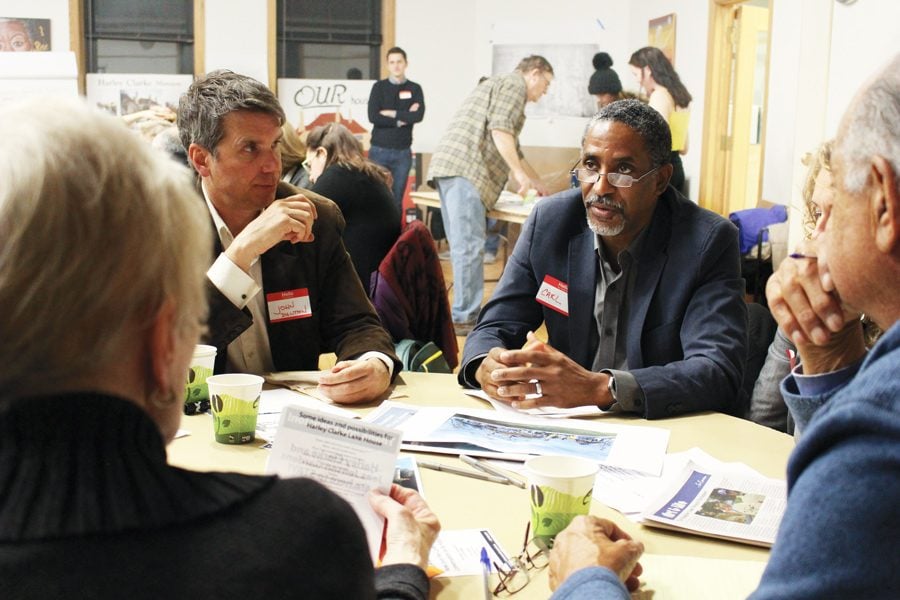Residents discuss minority access in Harley Clarke repurposing
Evan Robinson-Johnson/Daily Senior Staffer
Evanston residents meet to discuss ideas to repurpose the Harley Clarke mansion. Community members proposed repurposing plans that would provide more lakefront access to minorities.
January 25, 2019
Making the Harley Clarke mansion a more accessible space for minorities is a high priority, Evanston residents said at a community gathering Thursday.
The gathering at the Lorraine H. Morton Civic Center sought to highlight voices of minorities who historically have not had access to the Northeast lakefront, where the historic mansion is located. Community members pitched proposals for repurposing the property — including creating a cultural center or a space for urban studies. Many ideas centered around youth education to build community and increase accessibility to minorities and people of color.
The Evanston community has debated whether to preserve or destroy the Harley Clarke mansion — a historic property located on the lakefront in North Evanston — since the Evanston Art Center vacated the mansion in 2015. In an advisory referendum on the November ballot, roughly 80 percent of voters supported preserving the mansion for public use with the 5th Ward, which has a high concentration of black residents, showing the highest support.
Evanston resident Clare Kelly said the mansion should be accessible to all Evanston residents by providing programming and activities at the mansion. The lakefront is a “beautiful, very coveted” asset to Evanston, she said.
Repurposing the mansion through public programming would allow all residents to access the lakefront, Kelly said.
“This is our only public lakefront property,” she said. “The rest is pre-rarefied. It’s really important that the entire Evanston community feels welcomed there, is excited to go there and it’s truly accessed by everybody.”
Bennett Johnson, longtime civil rights activist and Evanston resident, grew up next to Harley Clarke, where he said he experienced discrimination and segregation. He said he was not allowed to attend a school right by his house and was instead forced to attend a school farther away.
In repurposing the mansion, Johnson said he hopes different communities in Evanston can be unified.
“This town has always had a history of segregation,” Johnson said. “This symbol can become a way to say we’re really finally together.”
Johnson said being near the lake is a “pleasure” but that historically people of color have not had that privilege.
Residents have to pay to go to the beach, Johnson said, which is a cost that makes the lakefront inaccessible to certain communities in Evanston.
“There are not many people in Evanston who are millionaires,” Johnson said. “And there are even fewer who live along the lake. That’s very pristine material.”
Johnson said increasing accessibility to the lakefront “enhances” the sense of community in Evanston.
2nd Ward resident Karli Butler said Harley Clarke’s lakefront location is less accessible to communities in West and South Evanston.
“It’s the North Shore,” Butler said. “So there’s this implied feeling of not necessarily being welcomed there.”
After hearing ideas from the Evanston community, Butler said she is more hopeful that repurposing Harley Clarke will integrate various demographic groups in the city.
Butler said she attended the community gathering “to be sure that the messaging around developing or building up Harley Clarke is that everyone from Evanston is welcomed.”
“It’s our space,” Butler said. “It’s not a North Shore space. It’s not a Sheridan Road space. It’s everyone’s space.”
Email: [email protected]
Twitter: @cassidyw_


